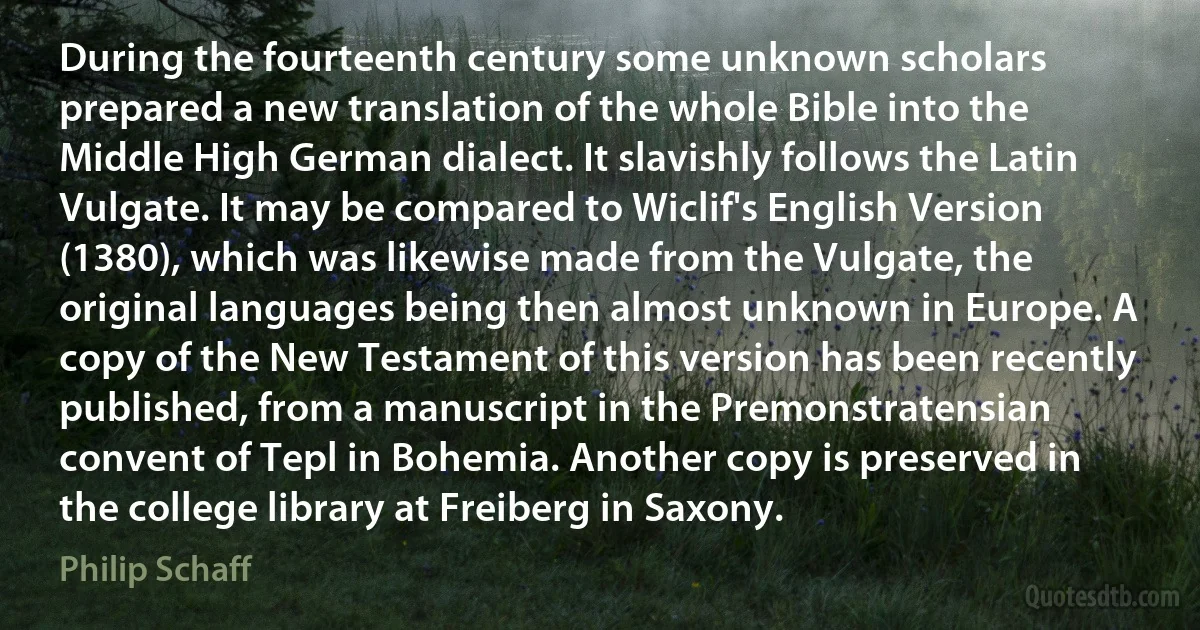
During the fourteenth century some unknown scholars prepared a new translation of the whole Bible into the Middle High German dialect. It slavishly follows the Latin Vulgate. It may be compared to Wiclif's English Version (1380), which was likewise made from the Vulgate, the original languages being then almost unknown in Europe. A copy of the New Testament of this version has been recently published, from a manuscript in the Premonstratensian convent of Tepl in Bohemia. Another copy is preserved in the college library at Freiberg in Saxony.
Philip SchaffRelated topics
almost bohemia century college english fourteenth high latin likewise manuscript middle unknown versionRelated quotes
[I]magination... is the faculty... the common root from which science and literature... spring and grow and flourish together. ...the great ages of science are the great ages of all the arts... [P]owerful minds have taken fire from one another... without asking... to tie their imagination to falling balls or a haunted island. ...When Galileo was looking through his telescope at the moon, Shakespeare was writing The Tempest and all Europe was in ferment, from Johannes Kepler to Peter Paul Rubens, and from the first table of logarithms by John Napier to the Authorized version of the Bible.

Jacob Bronowski
Day was breaking on the world. Light, hope, and freedom pierced with vitalizing ray the clouds and the miasma that hung so thick over the prostrate Middle Age, once noble and mighty, now a foul image of decay and death. Kindled with new life, the nations gave birth to a progeny of heroes, and the stormy glories of the sixteenth century rose on awakened Europe. But Spain was the citadel of darkness,-a monastic cell, an inquisitorial dungeon, where no ray could pierce. She was the bulwark of the Church, against whose adamantine wall the waves of innovation beat in vain.

Francis Parkman
At the end of the Middle Ages, leprosy disappeared from the Western world. In the margins of the community, at the gates of cities, there stretched wastelands which sickness had ceased to haunt but had left sterile and long uninhabitable. For centuries is, these reaches would belong to the non-human. From the fourteenth to the seventeenth century, they would wait, soliciting with strange incantations a new incarnation of disease, another grimace of terror, renewed rites of purification and exclusion.

Michel Foucault
The rediscovery of Spinoza by the Germans contributed to the shaping of the cultural destinies of the German people for almost two hundred years. Just as at the time of the Reformation no other spiritual force was as potent in German life as the Bible, so during the eighteenth and nineteenth centuries no other intellectual force so dominated German life as Spinozism. Spinoza became the magnet to German steel. Except for Immanuel Kant and Herbart, Spinoza attracted every great intellectual figure in Germany during the last two centuries, from the greatest, Goethe, to the purest, Lessing.

Baruch Spinoza
So it was in the Civil War. Farragut's father was born in Spain and Sheridan's father in Ireland; Sherman and Thomas were of English and Custer of German descent; and Grant came of a long line of American ancestors whose original home had been Scotland. But the Admiral was not a Spanish-American; and the Generals were not Scotch-Americans or Irish-Americans or English-Americans or German-Americans. They were all Americans and nothing else. This was just as true of Lee and of Stonewall Jackson and of Beauregard.

Theodore Roosevelt
